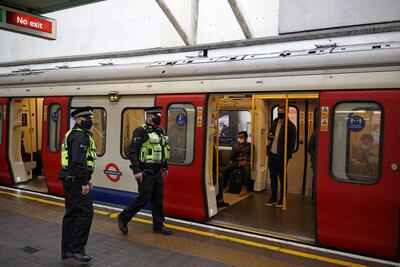The UK is increasing its Covid restrictions on Tuesday in an attempt to reduce the threat from the Omicron mutation first seen in southern Africa but that is already spreading across the world.
Masks become compulsory in some public spaces and Britain's vaccine booster campaign is being sped up but Prime Minister Boris Johnson has not introduced a full set of ‘plan B’ measures.
There are also new travel restrictions for people arriving in the country and the return of red list quarantine hotels for countries at the heart of the Omicron outbreak.
Where do I have to wear a mask?

The big change is that in public transport and shops, mask wearing is now mandatory. The full list of places where a mask is required is much longer and includes:
- Shopping centres
- Takeaways restaurants
- Auction houses
- Retail galleries
- Post offices
- Banks and building societies
- Solicitors and accountants
- Estate and lettings agents
- Retail travel agents
- Personal care and beauty premises
- Pharmacists
- Vets
Public transport includes:
- Planes
- Coaches
- Ferries
- Taxis and private hire vehicles
- Airports
- Transport hubs and stations
Where do I not need a mask?
You can go mask-free in:
- Restaurants
- Bars
- Theatres
- Cinemas
- Other hospitality settings.
Are there exemptions?
Yes. They include;
- Children under 11.
- People who cannot put on, wear or remove a face covering because of a physical or mental illness or impairment, or disability
- When people are speaking to or providing assistance to someone who relies on lip reading, clear sound or facial expressions to communicate
- To avoid harm or injury, or the risk of harm or injury, to yourself or others
- Police officers and other emergency workers
How have retailers reacted?
The British Retail Consortium says members will remind customers about the rules signs and in-store announcements.
The Association of Convenience Stores says it does not expect shops to challenge customers who refuse to wear a mask.
What are the punishments?
People not wearing a face mask can be fined £200 ($267) for a first offence, with increments rising up £6,400 for a sixth offence.
A second offence is £400 and a third is £800, with each offence doubling
If you pay the first offence fine inside 14 days it is reduced to £100.
What are the extra rules around the UK?
In Scotland, masks must also be worn in restaurants and pubs when people are standing. They are also needed in universities, in indoor public spaces and for school staff in secondary schools.
In Wales, masks must be worn in restaurants and pubs when people are standing. Pupils in secondary schools are asked to wear masks.
In Northern Ireland, masks must be worn at hospitality venues but not houses of worship. Students in class do not have to wear masks.
All UK nations, except England, are recommending that people work from home where possible.
What is plan B and is it looking like a lockdown for Christmas?
Plan B includes the steps the UK government can take reacting to Covid outbreaks and new strains like Omicron.
The government would prefer to stay largely on Plan A, which has most of the country working normally. Things like wearing face masks are personal responsibility rather than enforced.
Plan B measures include mask-wearing in hospitality venues and a return to working from home, both steps which are so far being resisted.
The thinking behind Plan B is to minimise the chances of a return to lockdowns.
Britain's next travel review is mid-December, which will be just in time for Christmas. By then, scientists can expect to have a better idea about Omicron, which was only confirmed as a threat four days earlier, and how badly it has hit the UK.

